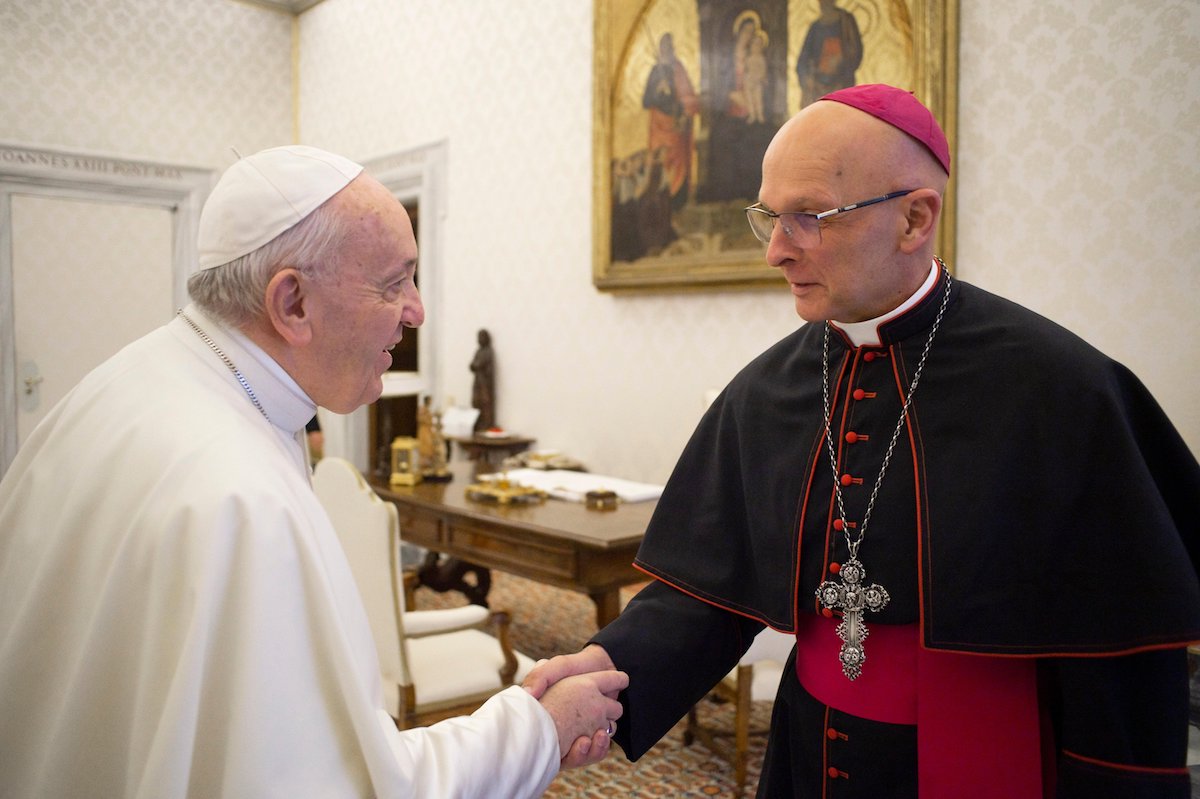WASHINGTON (CNS) — It’s “a fair question,” said Bishop James S. Wall of Gallup, New Mexico, to ask whether U.S. bishops “are cherry-picking” from among several evils confronting society by “focusing on abortion” in relation to whether Catholic politicians who support it should receive Communion.
“Why aren’t we seeking eucharistic sanctions for other evils that are rampant in society?” he asked, writing May 18 in the journal First Things. “The answer is that while there are many serious sins that diminish our worthiness to receive the Eucharist, only the gravest sins extinguish that worthiness entirely.”
He also said that he and other bishops he has talked to about the issue are “not motivated by political ends,” but by the “salvation of souls.”
As a body, the bishops have read “the signs of the times,” Bishop Wall said, referencing the Second Vatican Council document “Gaudium et Spes,” and they have “recognized that abortion is the great evil of our culture, and called it out as such for decades.”
“Back in 1998 our conference named abortion a ‘preeminent threat’ and in 2019 we reaffirmed that the ‘threat of abortion remains our preeminent priority because it directly attacks life itself,'” he wrote. “Pro-abortion political leaders have not heeded these calls, and now we seek to apply the last remaining and most severe medicinal option we have: eucharistic sanctions.”
Bishop Wall noted that a number of the Catholic bishops have issued statements on “on the question of whether to publicly deny pro-abortion politicians the Eucharist.”
“I am grateful to all my brother bishops who have courageously spoken out on this thorny subject,” he said. “When bishops share according to their conscience and listen to others’ points of view, they foster genuine dialogue — a necessary step on the path to unity.”
He said he was writing to respond to a May 5 essay by San Diego Bishop Robert W. McElroy published on the website of America magazine, the Jesuit journal, in which he wrote: “The Eucharist must never be instrumentalized for a political end, no matter how important.”
“I do not see how depriving the president or other political leaders of Eucharist based on their public policy stance can be interpreted in our society as anything other than the weaponization of Eucharist and an effort not to convince people by argument and by dialogue and by reason, but, rather, to pummel them into submission on the issue,” Bishop McElroy said.
Bishop Wall wrote: “While I don’t presume to know what’s in the mind and heart of my brother bishops, I am not motivated by political ends, nor are those with whom I have discussed the subject. Our concern is not political but pastoral; it is for the salvation of souls. This issue has political ramifications, but that is not an excuse to shy away at this crucial moment.”
“Bishop McElroy is also concerned that excluding pro-abortion politicians from Communion will weaken the unity of the church,” the New Mexico bishop continued. “Jesus prayed that Christians might all be one (John 17:21), and this is an obligation we must all take seriously. Yet he also said, ‘Do you think that I have come to give peace on earth? No, I tell you, but rather division’ (Luke 12:51).
“Speaking the truth at times appears to create division, but often it simply exposes the division that already exists,” Bishop Wall said. “If Catholics cannot agree on protecting the helpless unborn, then our unity is superficial at best and illusory at worst.”
Bishop McElroy argued in his essay that “those who would deny pro-abortion politicians Communion are applying an ‘extremely expansive’ litmus test that “applies sanctions very selectively and inconsistently.”
“Is this the case?” Bishop Wall asked. “Canon law states, ‘A person who is conscious of grave sin is not to celebrate Mass or receive the body of the Lord without previous sacramental confession’ (Canon 916).
“As abortion is one of the few sins that carries an automatic excommunication (Canon 1398), there is no doubt that a politician who actively protects abortion and strives to make it more accessible also risks his or her salvation,” Bishop Wall added. “It surely is not ‘expansive’ to put this evil in the category of grave sin.”
Rather than asking, “How many Catholic political leaders of either party could pass that test?” as to whether they are worthy to receive Communion, Bishop Wall said for him the “better question might be, ‘Have I done absolutely everything I can as a bishop to try to bring all pro-abortion Catholic politicians in my flock back into a state of grace?'”
For its part the Vatican, through the Congregation for the Doctrine of the Faith, has urged the U.S. bishops to proceed with caution in their discussions about formulating a national policy “to address the situation of Catholics in public office who support legislation allowing abortion, euthanasia or other moral evils.”
In a May 7 letter to Archbishop José H. Gomez of Los Angeles, president of the U.S. Conference of Catholic Bishops, Cardinal Luis Ladaria, congregation prefect, reiterated what he said he had told several groups of U.S. bishops during their 2019-2020 “ad limina” visits, namely that “the effective development of a policy in this area requires that dialogue occurs in two stages: first among the bishops themselves, and then between bishops and Catholic pro-choice politicians within their jurisdictions.”
Cardinal Ladaria also insisted: Such a policy cannot usurp the authority of an individual bishop in his diocese on the matter; the policy would require near unanimity; and it would be “misleading” to present abortion and euthanasia as “the only grave matters of Catholic moral and social teaching that demand the fullest level of accountability on the part of Catholics.”







